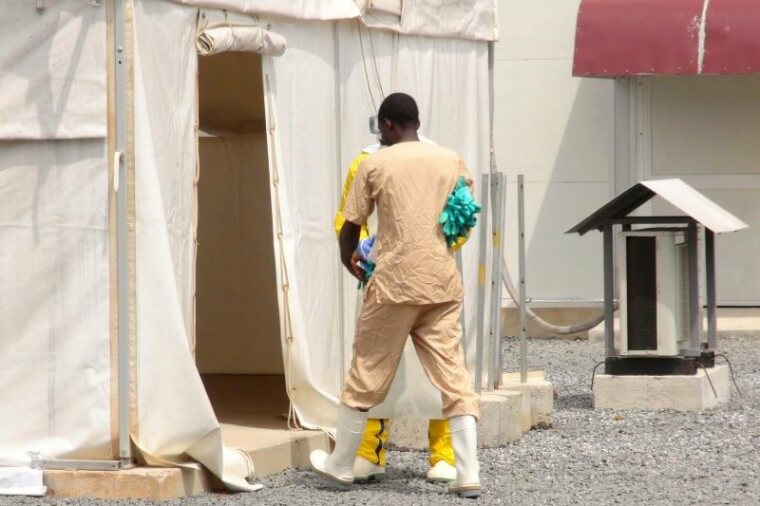Ebola vaccine proven to be 100 percent effective
A new Ebola vaccine was proven to be 100 percent effective against the lethal disease, based on final trials in Guinea and Sierra Leone.
According to a study published in The Lancet, no cases of Ebola were identified in Guinean trial participants who were vaccinated with rVSV-ZEBOV immediately after exposure to a person afflicted with Ebola. This suggests that the new vaccine provides 100 percent protection against the illness.

The Lancet research involved 11,841 participants from Guinea in 2015. About 5,837 subjects were administered with the vaccine immediately after getting into contact with an Ebola patient, and none of them contracted the disease 10 or more days later. Meanwhile, 23 Ebola cases were reported out of the thousands of others who did not receive the vaccine immediately after exposure.
The new vaccine is not without limitations. Two of the subjects who received it had serious reactions, but most reported mild side effects such as headaches, muscle aches, and fatigue.
The vaccine also offers protection only against strains under the Zaire group. It does not cover other strains of Ebola, including the deadly Marburg virus.
It was over a decade ago when Canada's Public Health Agency and the United States Army developed rsVSV-ZEBOV, which is now licensed to Merck, Sharp & Dohme.
The World Health Organization, the Guinean Health Ministry, and the Institute of Public Health of Norway led the Ebola trial, in collaboration with other institutions.
The vaccine has yet to receive approval from any regulatory authority, but Merck has committed an emergency stockpile of 300,000 doses that may be used in case another outbreak happens, according to The New York Times.
Ebola has been around since 1976, when the virus was discovered in the former Zaire. However, a sense of urgency to formulate an effective vaccine came about only after the 2014 outbreak, which resulted in 11,000 deaths in Africa.
"While these compelling results come too late for those who lost their lives during West Africa's Ebola epidemic, they show that when the next outbreak hits, we will not be defenseless," said study lead author Marie-Paule Kieny, who is also World Health Organization's assistant director-general for health systems and innovation, as quoted by The New York Times.
 Christians don't have to affirm transgenderism, but they can’t express that view at work: tribunal
Christians don't have to affirm transgenderism, but they can’t express that view at work: tribunal Archaeology discovery: Medieval Christian prayer beads found on Holy Island
Archaeology discovery: Medieval Christian prayer beads found on Holy Island Presbyterian Church in America votes to leave National Association of Evangelicals
Presbyterian Church in America votes to leave National Association of Evangelicals Over 50 killed in 'vile and satanic' attack at Nigerian church on Pentecost Sunday
Over 50 killed in 'vile and satanic' attack at Nigerian church on Pentecost Sunday Ukrainian Orthodox Church severs ties with Moscow over Patriarch Kirill's support for Putin's war
Ukrainian Orthodox Church severs ties with Moscow over Patriarch Kirill's support for Putin's war Islamic State kills 20 Nigerian Christians as revenge for US airstrike
Islamic State kills 20 Nigerian Christians as revenge for US airstrike Man who served 33 years in prison for murder leads inmates to Christ
Man who served 33 years in prison for murder leads inmates to Christ


 Nigerian student beaten to death, body burned over ‘blasphemous’ WhatsApp message
Nigerian student beaten to death, body burned over ‘blasphemous’ WhatsApp message 'A new low': World reacts after Hong Kong arrests 90-year-old Cardinal Joseph Zen
'A new low': World reacts after Hong Kong arrests 90-year-old Cardinal Joseph Zen Iran sentences Christian man to 10 years in prison for hosting house church worship gathering
Iran sentences Christian man to 10 years in prison for hosting house church worship gathering French Guyana: Pastor shot dead, church set on fire after meeting delegation of Evangelicals
French Guyana: Pastor shot dead, church set on fire after meeting delegation of Evangelicals ‘Talking Jesus’ report finds only 6% of UK adults identify as practicing Christians
‘Talking Jesus’ report finds only 6% of UK adults identify as practicing Christians Mission Eurasia ministry center blown up in Ukraine, hundreds of Bibles destroyed: 'God will provide'
Mission Eurasia ministry center blown up in Ukraine, hundreds of Bibles destroyed: 'God will provide' Church holds service for first time after ISIS desecrated it 8 years ago
Church holds service for first time after ISIS desecrated it 8 years ago Burger King apologizes for 'offensive campaign' using Jesus' words at the Last Supper
Burger King apologizes for 'offensive campaign' using Jesus' words at the Last Supper Uganda: Muslims abduct teacher, burn him inside mosque for praying in Christ’s name
Uganda: Muslims abduct teacher, burn him inside mosque for praying in Christ’s name